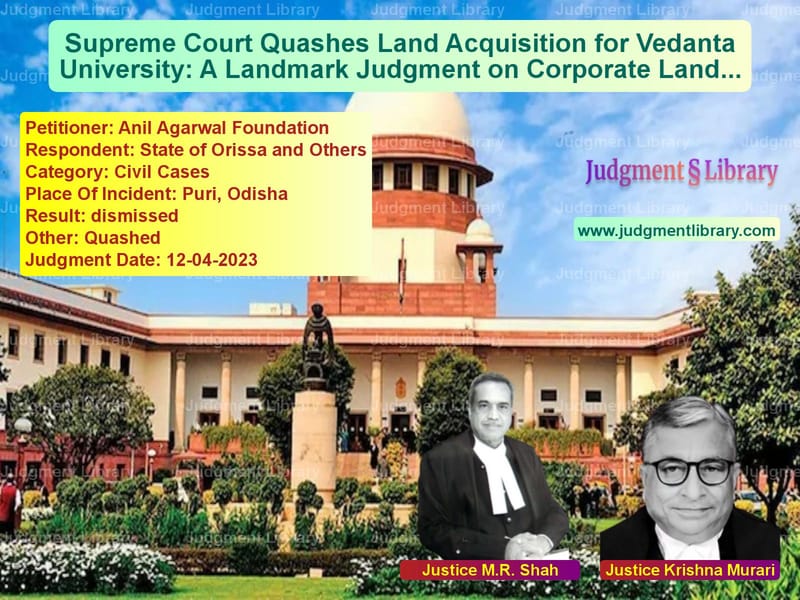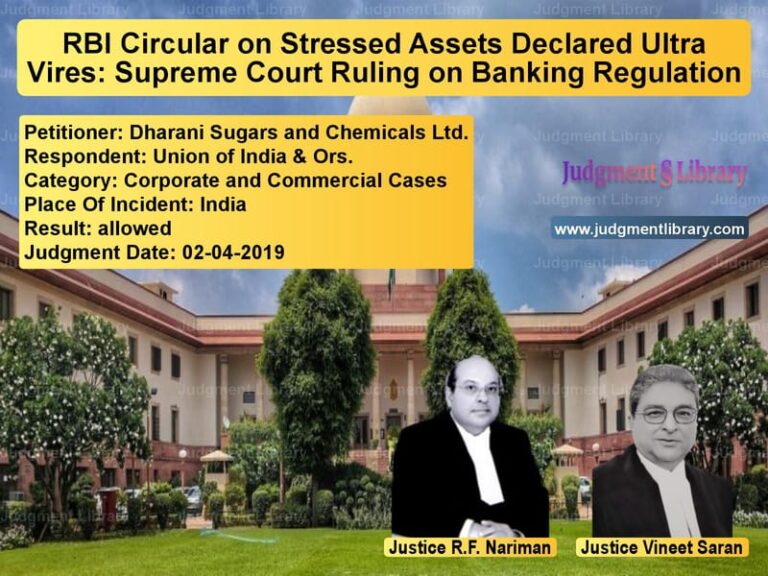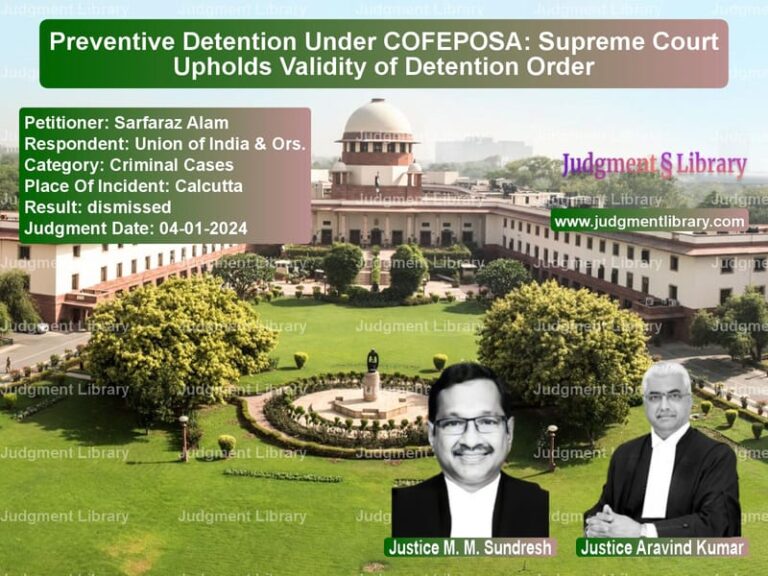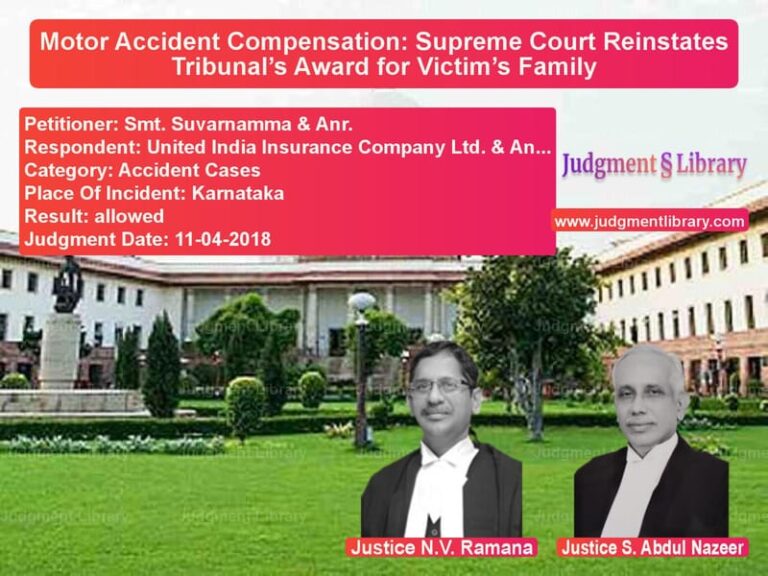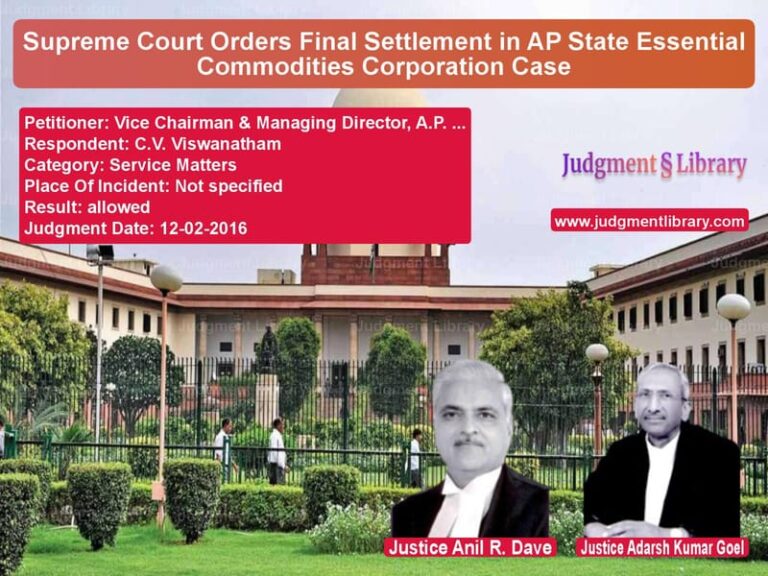Supreme Court Quashes Land Acquisition for Vedanta University: A Landmark Judgment on Corporate Land Grab
The Supreme Court of India has delivered a landmark judgment in the case of Anil Agarwal Foundation v. State of Orissa & Others, striking down the large-scale land acquisition undertaken by the Odisha Government for the proposed Vedanta University. The ruling, which upholds the rights of displaced landowners, exposes procedural irregularities and legal violations in the land acquisition process. The judgment has significant implications for corporate land acquisitions and reaffirms the principles of transparency, fairness, and adherence to environmental laws.
Background of the Case
In 2006, the Odisha Government signed a Memorandum of Understanding (MoU) with Vedanta Foundation (later renamed Anil Agarwal Foundation) for the establishment of Vedanta University in Puri, Odisha. The university was envisioned as a world-class institution requiring 15,000 acres of land. However, after facing opposition from landowners and activists, the land requirement was reduced to 6000 acres.
Between 2006 and 2008, the Odisha Government initiated proceedings under the Land Acquisition Act, 1894 to acquire land for the university. However, the process was marred by allegations of irregularities, lack of transparency, and violation of statutory requirements under the Land Acquisition (Companies) Rules, 1963. The Odisha High Court in 2010 quashed the acquisition, citing multiple violations.
Dissatisfied with the High Court’s ruling, the Anil Agarwal Foundation approached the Supreme Court, arguing that the university was a project of public interest and the acquisition was lawful.
Key Legal Issues
The Supreme Court examined the following crucial legal questions:
- Did the land acquisition process comply with the Land Acquisition Act, 1894?
- Was the Anil Agarwal Foundation eligible to receive land under the Land Acquisition (Companies) Rules, 1963?
- Did the Odisha Government conduct due diligence before acquiring land?
- Were the environmental and ecological concerns adequately considered?
- Did the acquisition serve a genuine public purpose?
Arguments by the Petitioner (Anil Agarwal Foundation)
The Anil Agarwal Foundation, represented by senior counsel, contended:
- Public Purpose of the University: The petitioner argued that the university was of national importance and would contribute to India’s higher education sector.
- Government Approval: The acquisition was approved by the state government, which was satisfied with the need for the project.
- Land Ownership Justification: The foundation maintained that it had transformed from a private company to a public company before the final land acquisition process, making it eligible for land acquisition.
- Environmental Compliance: The foundation contended that all necessary environmental clearances were sought and obtained.
Arguments by the Respondents (State of Odisha & Landowners)
The landowners and environmental activists strongly opposed the acquisition, contending:
- Illegal Acquisition: The acquisition violated the Land Acquisition Act, 1894 as the Anil Agarwal Foundation was a private company and not eligible for state-assisted land acquisition.
- Forced Displacement: Thousands of families were being evicted from their land without proper rehabilitation.
- Environmental Risks: The land was ecologically sensitive, near the Balukhand-Konark Wildlife Sanctuary and crucial water bodies.
- Fraudulent Representation: The foundation falsely claimed to be a public company while remaining a private corporate entity.
Supreme Court’s Ruling
1. Land Acquisition Violated the Law
The Supreme Court held that the land acquisition process was unlawful, citing violations of the Land Acquisition Act and the Land Acquisition (Companies) Rules, 1963. The Court observed:
“The manner in which the land acquisition process was conducted reveals a clear case of procedural impropriety. The failure to comply with the requirements of the Land Acquisition (Companies) Rules, 1963, renders the acquisition invalid.”
2. Anil Agarwal Foundation Was a Private Entity
The Supreme Court noted that at the time of acquisition, the foundation was a private company and thus ineligible to receive land under the Land Acquisition Act, which permits acquisitions only for public entities. The Court stated:
“The transformation of the Anil Agarwal Foundation from a private entity to a purported public entity was a mere facade to circumvent legal restrictions on private land acquisition.”
3. Violation of Environmental Laws
The Supreme Court found that the Odisha Government had ignored environmental concerns:
“The proposed land acquisition was in close proximity to ecologically sensitive areas. The failure to conduct a thorough Environmental Impact Assessment before proceeding with the acquisition makes the process legally untenable.”
4. The University Project Was Not a Bona Fide Public Purpose
The Supreme Court ruled that while education is a noble cause, the acquisition in this case did not serve a legitimate public purpose:
“The concept of public purpose must be interpreted in a manner that does not allow private commercial interests to masquerade as public projects. The evidence in this case does not support the conclusion that the university project was for the genuine benefit of the public.”
5. Supreme Court Directs Land to Be Returned
The Court directed the Odisha Government to return the acquired land to the original landowners and revoke all grants made in favor of the Anil Agarwal Foundation.
Final Judgment
The Supreme Court ordered:
- The cancellation of all land acquisition proceedings.
- The restoration of land to its original owners.
- The Odisha Government to reimburse landowners who had already received compensation.
- A fine of ₹5 lakh on the Anil Agarwal Foundation for misrepresentations.
Key Excerpt from the Judgment
The Supreme Court summarized its ruling as follows:
“The acquisition process, from inception to execution, was marred by illegalities, lack of transparency, and procedural violations. The attempt to justify the acquisition in the name of public interest does not hold water. Consequently, we hold the entire acquisition process as null and void.”
Conclusion
The Supreme Court’s ruling in Anil Agarwal Foundation v. State of Orissa serves as a strong precedent against corporate land grabs. The decision reinforces the principle that land acquisition must be conducted transparently, with due process, and only for a genuine public purpose. The ruling also upholds the rights of displaced landowners and sets a high bar for future land acquisition cases involving private corporations.
This judgment is expected to have wide-reaching implications on corporate land acquisitions, particularly in sectors such as education, infrastructure, and industrial development.
Petitioner Name: Anil Agarwal Foundation.Respondent Name: State of Orissa and Others.Judgment By: Justice M.R. Shah, Justice Krishna Murari.Place Of Incident: Puri, Odisha.Judgment Date: 12-04-2023.
Don’t miss out on the full details! Download the complete judgment in PDF format below and gain valuable insights instantly!
Download Judgment: anil-agarwal-foundat-vs-state-of-orissa-and-supreme-court-of-india-judgment-dated-12-04-2023.pdf
Directly Download Judgment: Directly download this Judgment
See all petitions in Property Disputes
See all petitions in Landlord-Tenant Disputes
See all petitions in Environmental Cases
See all petitions in Damages and Compensation
See all petitions in Judgment by Mukeshkumar Rasikbhai Shah
See all petitions in Judgment by Krishna Murari
See all petitions in dismissed
See all petitions in Quashed
See all petitions in supreme court of India judgments April 2023
See all petitions in 2023 judgments
See all posts in Civil Cases Category
See all allowed petitions in Civil Cases Category
See all Dismissed petitions in Civil Cases Category
See all partially allowed petitions in Civil Cases Category

